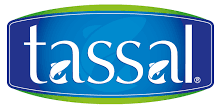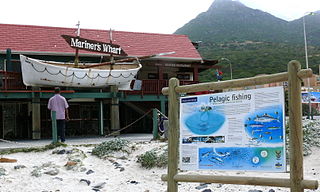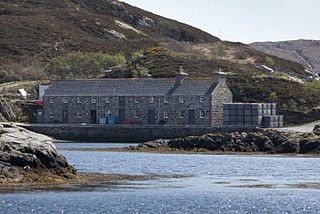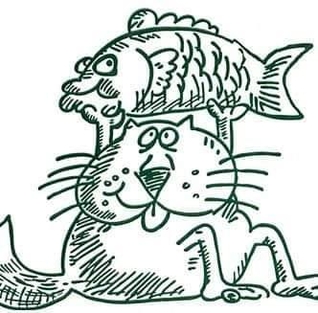
A raw bar is a small restaurant or a bar within a restaurant where live shellfish are shucked and served. Raw bars typically offer a variety of raw and cooked seafood and shellfish that is served cold. Seafood-based dishes may also be offered, and additional, non-seafood foods may also be part of the fare. Raw bars may offer alcoholic beverages such as oyster shooters, as well as wine and sake that is paired with various foods. Additional accompaniments may include condiments, sauces and foods such as lemon and lime. Several restaurants in the United States offer raw bars, some of which are seasonal.

Tassal is a Tasmanian-based Australian salmon farming company founded in 1986. It was listed on the Australian Securities Exchange (ASX) from 2003 until 2022. Tassal is the largest producer of Tasmanian grown Atlantic salmon, supplying salmon to both domestic and international markets. In November 2022, it was acquired by Canadian seafood company Cooke Inc. and delisted from the ASX.
Mowi ASA, known as Marine Harvest ASA until January 1, 2019 and as Pan Fish prior to February 6, 2007, is a Norwegian seafood company with operations in a number of countries around the world. The company's primary interest is fish farming, primarily salmon, the operations of which are focused on Norway, Scotland, Canada, the Faroe Islands, Ireland and Chile. The group has a share of 25 to 30% of the global salmon and trout market, making it the world's largest company in the sector. Mowi also owns a 'value added processing' unit, which prepares and distributes a range of seafood products, and a number of smaller divisions.

Mariner's Wharf is a prominent landmark and tourist attraction in Hout Bay, South Africa. Situated between the beach and the adjacent harbor entrance, it was originally built in 1979 as workshops, storage and offices by Stanley Dorman for his fishing operations. Subsequently, due to a serious decline in the industry he decided to repurpose the structure, converting it into a harbor front emporium. Initially it consisted of a fresh fish market, an outdoor fish-and-chips bistro, sea-shanty restaurant as well as a small shop specializing in local seashells and souvenirs.

Cairndow is a coastal hamlet on the Cowal Peninsula, in Argyll and Bute, Scottish Highlands. The town lies between the A83 road and the head of Loch Fyne.

Integrated multi-trophic aquaculture (IMTA) is a type of aquaculture where the byproducts, including waste, from one aquatic species are used as inputs for another. Farmers combine fed aquaculture with inorganic extractive and organic extractive aquaculture to create balanced systems for environment remediation (biomitigation), economic stability and social acceptability.

Loch Fyne Restaurants was the name of a chain of seafood restaurants in the United Kingdom owned and operated by Greene King plc.
This page is a list of fishing topics.

Aquaculture started to take off in New Zealand in the 1980s. It is dominated by mussels, oysters and salmon. In 2007, aquaculture generated about NZ$360 million in sales on an area of 7,700 hectares. $240 million was earned in exports.

Aquaculture in Australia is the country's fastest-growing primary industry, accounting for 34% of the total gross value of production of seafood. 10 species of fish are farmed in Australia, and production is dominated by southern bluefin tuna, Atlantic salmon and barramundi. Mud crabs have also been cultivated in Australia for many years, sometimes leading to over-exploitation. Traditionally, this aquaculture was limited to table oysters and pearls, but since the early 1970s, there has been significant research and commercial development of other forms of aquaculture, including finfish, crustaceans, and molluscs.
Organic aquaculture is a holistic method for farming fish and other marine species in line with organic principles. The ideals of this practice established sustainable marine environments with consideration for naturally occurring ecosystems, use of pesticides, and the treatment of aquatic life. Managing aquaculture organically has become more popular since consumers are concerned about the harmful impacts of aquaculture on themselves and the environment.

A seafood restaurant is a restaurant that specializes in seafood cuisine and seafood dishes, such as fish and shellfish. Dishes may include freshwater fish. The concept may focus upon the preparation and service of fresh seafood,. Some seafood restaurants also provide retail sales of seafood that consumers take home to prepare. Seafood restaurants may have a marine-themed decor, with decorations such as fish nets, nautical images and buoys. Fare can vary due to seasonality in fish availability and in the fishing industry. Seafood restaurants may offer additional non-seafood items, such as chicken and beef dishes.

Loch Duart is a small, independent Scottish salmon farming company. It is headquartered in Scourie, Sutherland in north-west Scotland and has just over 100 employees. The company owns and operates eight sea sites and two hatcheries in Sutherland and the Outer Hebrides. Sales, marketing and finance departments are located in Montrose and a French sales and marketing office in Lorient, Brittany.

Aquaculture in the United Kingdom is dominated by salmon farming, then by mussel production with trout being the third most important enterprise. Aquaculture in the United Kingdom represents a significant business for the UK, producing over 200,000 tonnes of fish whilst earning over £700 million in 2012 (€793 million).

Flying Fish Company is a sustainable seafood company which operates a fish market, restaurant, and food cart in Portland, Oregon.

Jack's Fish Spot is a fish market and seafood bar at Seattle's Pike Place Market, in the U.S. state of Washington.
Sanford Ltd is a New Zealand fisheries company, founded in 1904 and based in Auckland.













